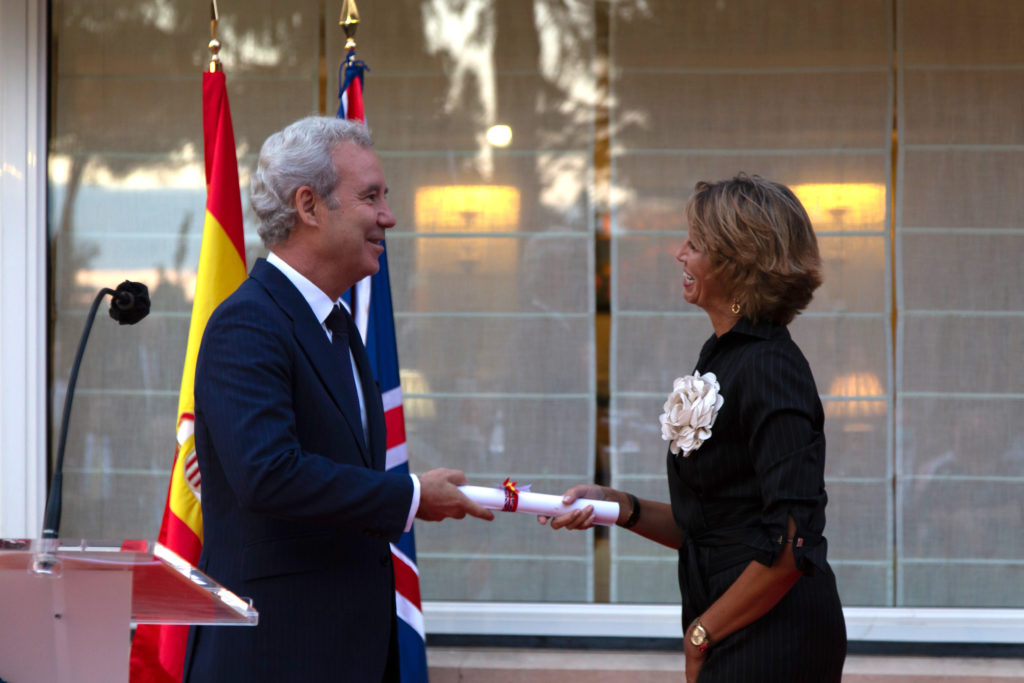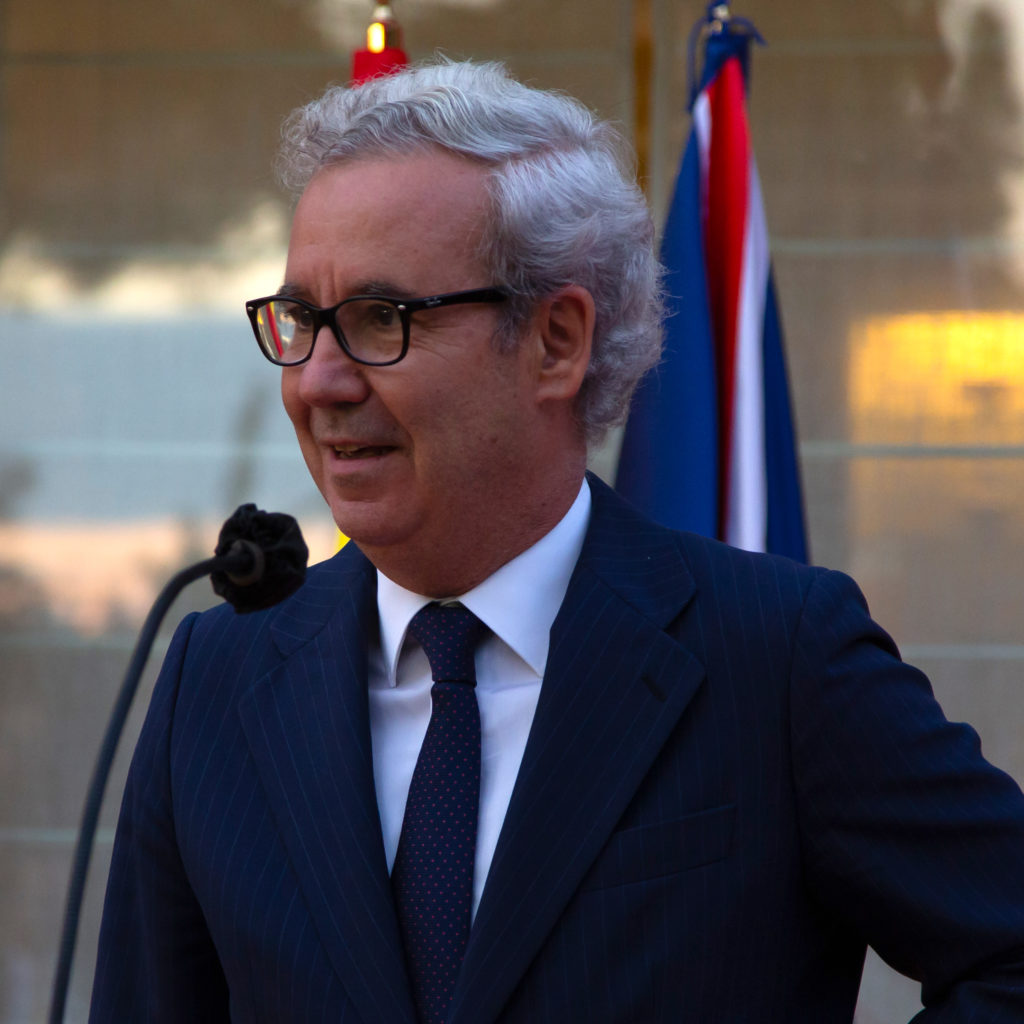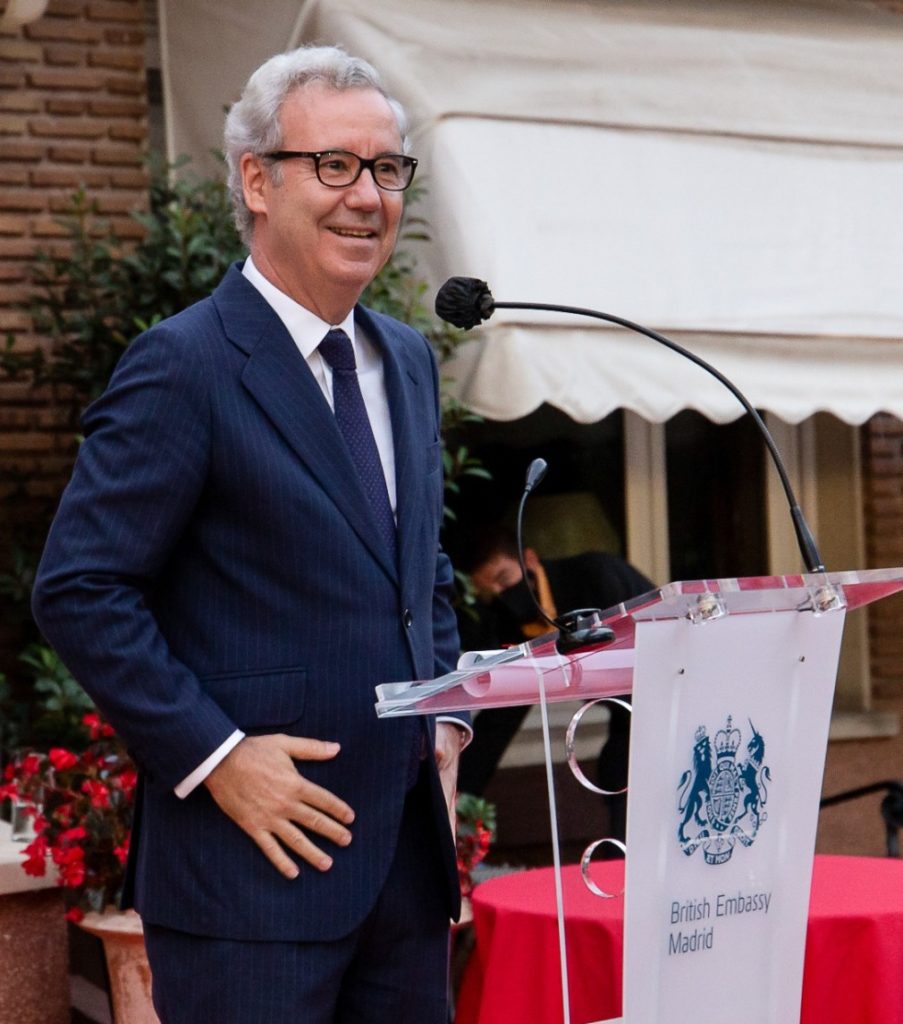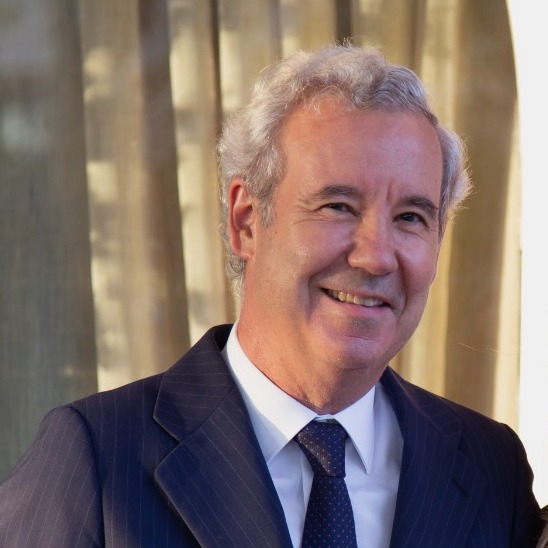FHB Interview with JOSÉ MARÍA DE AREILZA CARVAJAL, CONDE DE MOTRICO, “FHB Friend of Honour 2021”
José María de Areilza Carvajal, conde de Motrico, is known as an International Relations expert, as Secretary General of the Aspen Institute, as a teacher, as a writer, as an inspiration for young politicians, as someone particularly close to the United Kingdom and now too as the latest recipient of the FHB ‘Friend of Honour’ award. Though formal at first, the interview soon turns into an engaging conversation…
ISABEL AIZPÚN
November 2021
Before even starting the interview you were wondering why you were chosen for this award…
Well first of all I don’t think I really deserved it! The only reason I can think of, however, is that I am a massive anglophile. Ever since I was a child I have been extremely lucky to be able to learn English in the UK. My first summer job was in the City; my father worked many years for the oldest bank in England… I’ve always felt extremely close. As a Professor of European Law, I’ve had the chance to work alongside many British specialists and even today I teach two annual seminars on leadership at Chatham House. I’ve always felt that the UK was a part of my natural environment.
What does being an anglophile entail?
I think it’s about realising that the British ‘spirit’ has become an integral part of Europe as a concept. There have been many contributions – democracy, freedom, fundamental rights, open debate – which have been imported from the UK and which allow us to understand and see ourselves as Europeans. Alongside, of course, the wider influence of the UK in everything related to international trade, globalisation, security and defence. In my case at least it was a firm choice I made after carefully reflecting on what it means to be European.

of the British Hispanic Foundation. September 2021.
I imagine Brexit must have been painful…
It’s a real shame. It has been really painful for both European – myself included – and British citizens alike, but it’s a decision we must learn to live with. We must keep looking forward andmove on from the berating and the mistrust and instead try to build a relationship which is as constructive as possible. We share many common interests and have the same values at heart, which is why we need to re-establish the strong relationship as soon as possible. It certainly won’t be easy in the short term, which is why I think everyone – civil society, governments, the media – should engage in a concerted effort.
As President of the British-Spanish Tertulias, you are in a unique place to channel these efforts…
The ‘Tertulias’ are currently the most important bilateral forum between the United Kingdom and Spain. They were created in 1998, after the endorsement of both monarchies following a visit from Elizabeth II to Spain and another from Juan Carlos to the UK. The idea behind the meetings was to promote the cultural, scientific and economic ties between both countries through an annual three-day meeting with representatives from civil society and government. Testament to its influence is that we have recently held the 32nd edition after the Covid-19 pandemic. It’s a meeting geared up to talk in a frank and natural manner – in full trust – about all bilateral matters in a global context. A set of placid, interesting and calm meetings…what was nothing but a discrete conversation among friends has led to many interesting topics and materialised in several projects. We’re trying to update them so that they continue to serve their original purpose of reinforcing the bilateral relationship. The next round will take place in Bilbao at the end of November.
As well as an avid anglophile, you are also an expert in international relations and a geopolitical analyst. From what I can see on your CV, you specialise in influence and power dynamics in organisation. This sounds quite troubling… what exactly is it all about?
I am lucky to have two different academic fields which I both research and teach: the first is European Union Law and the second is influence and power in organisations, a course which teaches professionals how to think, analyse, obtain and use power within their organisations.
Professionals from what field?
From any at all. From the world of politics, business or third sector… It’s a particularly useful subject to help one understand what we actually should be analysing and how to use power to contribute to the common good. As Edmund Burke once said, the only thing necessary for the triumph of evil is for good men to do nothing. What we often see is that power is something which people with principles and ideals tend to avoid – almost as if power wasn’t something of their concern. Yet power is neutral and ultimately depends on whoever wields it. This is why the course helps one understand how to achieve your objectives in a given context and – of course – how to do so both efficiently and according to your own professional goals. I currently teach the course at ESADE and also in Virginia and Paris before the pandemic.

Let’s get your expert opinion on a range of scenarios. The United States naturally comes to mind; we are at the Aspen Institute after all. Do you think the discontent which ultimately led to populism have come to an end? Is this sentiment still being exploited by the very same people?
In my role as secretary of the Aspen Institute in Spain, I’ve followed the debate surrounding populism and its many consequences very closely. I hope that the Trump Administration is the exception to the rule and not the other way round. There is a very real possibility of Trump coming back and winning the 2024 presidential elections and I think we should be wary of the consequences that would entail for democracy not only in the United States but worldwide. But I think we should also attempt to comprehend why many Americans voted for him in the first place. There’s a large part of the US which doesn’t feel represented by the urban,‘big-city’ candidates which are overly occupied with issues of culture and identity – issues which aren’t on most citizens’ agendas. For some years now the US has taken a big step back and it has been Merkel, rather than Trump, who has been the leader of the free world. However, we must also bear in mind that in today’s reality, with China on the rise, we need a US with both the capacity and the will to act and engage with its European allies in the advancement of their common values. Of course, it will depend on Europe also being able to solve global issues.
In large part because China has already earned ‘superpower’ status…
China is a great country which is currently trying to find a role for itself on the international arena. It has a very clear and frankly successful strategy in areas such as the digital economy, artificial intelligence, infrastructure investment, military affairs and especially when it comes to ensuring its long-term economic growth. The problem is that it offers liberal democracies an autocratic alternative – an alternative model which is often successful. For Western powers, the problem will be balancing cooperation on certain issues such as the climate with containment. We don’t want to import Chinese societal values, we want to defend democracy and liberty. One of their main structural advantages, however, is that they firmly believe in their own model and way of doing things.
What do you think the future holds for the Middle East?
The US has been retreating from the region ever since the Obama Administration – then with Trump and now with Biden. We’re seeing a return of the old ‘empires’: the Turkish, the Iranians, the Russians… There’s no doubt that that it is an important region which has become increasingly unstable after the American withdrawal. A region where as Europeans we should seek to multiply our current efforts to help maintain peace.
As Secretary of the Spanish branch of the Aspen Institute and as a member of many academic and civil society organisations, what do you make of Spain right now?
Like many other neighbouring countries, Spain is trying to leave the pandemic behind by focusing on a strong economic recovery. But its politics needs to improve. I miss a Spain where politics was about working hard on building consensus and finding common ground. Unfortunately, all we’re seeing nowadays is heated political rhetoric seeking to polarise and treat political rivals as if they were the enemy. But in reality there’s a lot of room for agreement, particularly when it comes down to the issues which concern the Spanish population the most: climate change, social cohesion, equality… These broad consensus should be the starting point of politics, which should really seek to build a common future without breaking a collective effort stretching back more than forty years.
One of our main activities is working with young politicians. We bring them together and we get them talking on the big debates of our times: geopolitics, leadership, ethics…It’s been more than seven years since we first organised these meetings and I must say that this younger generation really does understand that our differences can in fact be embraced and that there is a lot of common ground to work on.

Any advice for younger members who might be joining the Foundation?
Thinking of my own children, I would make sure that their natural curiosity never runs out; that that they never become overly sceptic or get too comfortable. I always tell my students that the worst part of a cynic who thinks nothing will ever change is that they become lazy intellectually and stop asking the most crucial questions. We have to promote their inner curiosity. That drive to ask even more questions, to think about anything and everything and to believe that things can always change for the better.
We have to seriously consider the world we are going to leave behind for our own children and grandchildren… We’ve got many short term priorities: pensions, demographic change, migrations… and the sooner the younger generations become a part of the conversation, the better. They’re all challenges which as it stand will undoubtedly affect them without us having even asked what they thought. But also the challenge of taking full advantage of up and coming digital technologies; ensuring that it leads to equal opportunities, to economic growth, towards new sources of knowledge.
The problems arising from decreasing attention spans due to the widespread use of digital tech is something which I must say I find rather worrying. Digital technology which not only limits our attention span and our capacity to concentrate, but is also based on an economic model with the sole purpose of continuously grabbing our attention. As a Harvard professor once said, it doesn’t just take our data, it changes our very behaviour.
With such an extensive academic curriculum, do you still have a thirst for research and studying?
One of the main advantages of being a teacher is that one can choose what you’re going to study next…which reminds me of what an old English teacher used to say: “I don’t know anything about this topic, I’m now going to have to write a book about it.” Building further on the concepts of power and influence, I’m going to finish writing about a case involving Angela Merkel and her own relationship with power. During the pandemic I’ve also started writing a book on how to reform the European Union and how to reimagine Europeanist thought for the future. Another similarly prominent matter is sustainability. How to think about sustainability from a European perspective and as a long-term existential challenge. A challenge which looks to the longer term and allows us to consider issues such as climate change, the energy transition, the future of democracy and even the future of capitalism.

